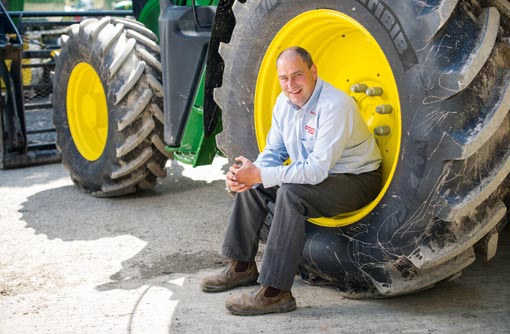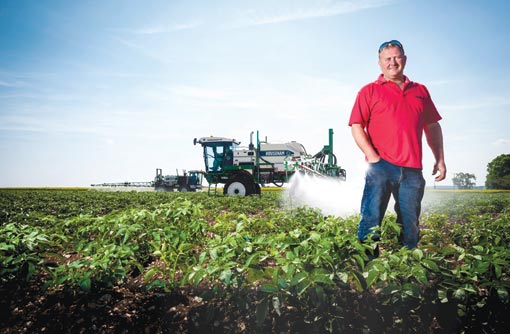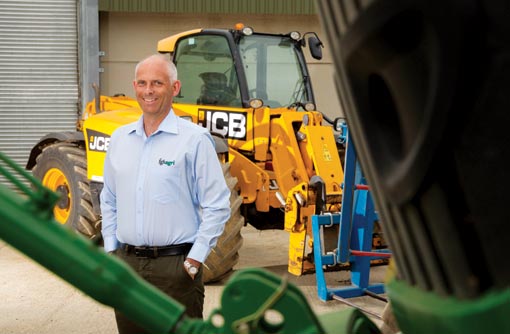2013 Farmers Weekly Contractor finalists revealed

Farm contractors keep the wheels of UK agriculture rolling, and without them many farmers would struggle to run their businesses. James Andrews meets three shining examples of the breed.
Mark Andrew
Glenmeade, Tamsquite, Cornwall

Running a large contracting outfit is never easy, however large the farmer’s fields and however excellent the access.
But keeping 900 farmers happy when field sizes average just 3ha and roads are almost impassable takes a special kind of management. This is where Mark Andrew and his Cornwall-based contracting team excel.
Based near Bodmin in one of the more geographically challenging parts of the country, Andrew has to contend with narrow lanes, tiny bridges and low branches wherever he goes. When he eventually gets to the farm he has to work with small, old silage clamps and incredibly tight yards.
But with decades of experience between them, and clear instruction from Mark, the team manages to get the job done quickly and efficiently whatever the odds.
BUSINESS FACTS
- 900 clients within a 30-mile radius
- Cuts 2,500-3,000ha grass silage
- Bales and wraps 10,000 round bales
Mark started building up his own business in 1994 when he left his job as an agricultural engineer at local dealer Burgess. At first he was carrying out engineering work for local farmers on his own, but within three years he had built the business up to a point where he was able to employ a full-time fitter and two tractor drivers.
When a local contractor decided to sell his business in 1998, Mark capitalised on the opportunity and bought it. “I could see the potential of contracting and felt it was the way to move forward in the agricultural industry.”
Fifteen years later and the investment has clearly paid off. Mark and his team now specialise in forage production and cut and process 2,500-3,000ha of grass silage every year. On top of this they clamp 200ha of wholecrop silage, 600ha maize silage and cut 150ha miscanthus.
He also produces and wraps more than 10,000 round silage bales, sells 3,000t of straw and 6,000 bales of hay/silage a year as well as providing scores of other services for local farmers.
Carrying out the work is one thing, but key to Mark’s success is his tight handle on costs and accurate bookkeeping. Much of this is down to the skills of his partner Nat in the office. “We are completely disciplined on the bookkeeping side of the business. We reconcile with the bank weekly, keeping a check on our finances and cashflow,” she says.
Nat also makes sure invoices are sent out promptly. “This has been a very important part of our business,” says Mark. “If we had not kept a very close eye on our expenses and cashflow we could not have done what we have.”
Mark runs a modern machinery fleet, which thanks to his engineering background is perfectly maintained. He and his team carry out almost all of their own maintenance and tow a mobile workshop behind their buckraking tractor to cater for any mid-job calamities. It has almost everything you could possibly need for alfresco repairs, from a welder and gas cutter to a spare parts store and workbench.
Mark has also just invested in a state-of-the-art new building with workshop, office and staff facilities that would put many agricultural dealers to shame.
But even though Mark has the facilities and expertise to keep his kit running, he tries to change major items every three to five years. “This helps us minimise repair costs and make sure we keep up with the latest developments and stay competitive.”
Mark employs more than 15 full-time staff and most of them have been working for him for years. With another five on the books at busy times of year, and an apprentice from Duchy College, he’s one of the biggest employers in the area – a role he takes very seriously. “I put all my staff through the necessary training and make sure they’ve got the qualifications they need to operate safely and legally.”
Mark also works hard to secure a year-round supply of work for the men so that he can keep them in full-time employment.
Philip Clappison
Cowlam Grange, Cowlam, East Yorkshire

Drive into many large-scale contractors’ yards and you’ll be tripping over the rows of shiny new machinery.
But pay a visit to East Yorkshire potato contractor Philip Clappison and you’ll find someone who isn’t afraid to run machinery a bit longer in the tooth.
In fact, buying second-hand is one of the secrets to Philip’s success. By paying a fraction of the new price he has built up an impressive fleet of potato equipment including 10 destoners and 10 harvesters.
That means he’s got the resources to get the job done, whatever Mother Nature throws at him. And when others have been forced to throw in the towel Philip has always delivered.
“Over the years I’ve built up a reputation for getting the job done, often in extreme conditions,” he says. “I never give up and I haven’t failed to get a crop in or out of the ground yet.”
BUSINESS FACTS
- Plants and harvests more than 1,200ha of potatoes
- Desiccates 2,000ha of potatoes with flail and spray system
- Combining and muckspreading
- Potato grading and spraying
This grit and determination has helped Philip secure contracts with potato-producing big boys such as Branston and Albanwise.
In 2012 Philip planted and harvested a whopping 1,200ha of potatoes and he’s set to take on even more. But there’s more to Philip’s expertise than just getting the crop in and out of the ground.
His knowledge of the potato crop is second to none and this means he can spot potential disease or quality problems before they get to the store.
“I treat everyone’s spuds as if they’re my own,” he says. “I’ll never lift them without considering their condition.”
Running a lot of older equipment can be a risky strategy. But Philip’s fastidious approach to maintenance and his incredible parts store ensure he keeps going.
“If you keep on top of the maintenance there’s no need to keep changing your equipment,” he says. “A well-maintained second-hand lifter will be more reliable than a badly maintained new one.”
Preparation starts at the end of the season when every machine is ushered into the farm workshop for an overhaul. It’s then oiled, greased and parked under cover ready for action the following year.
When the inevitable does happen, the parts store comes to the rescue. Philip runs an all-Grimme fleet of potato equipment and has enough parts on the farm to keep every machine going. “We’ve got so many parts we sometimes get Grimme phoning up to borrow some,” he says.
But not all machines on the farm are old. When it comes to tractors and telehandlers he likes to keep them new and under warranty. “We’ve had big problems with tractors in the past so we buy them with a four-year warranty and sell when it’s up.”
As well as his day-to-day spud-growing duties, Philip has found time to innovate and look for new business opportunities. When he saw an end to the use of sulphuric acid for burning down potato tops, he decided to come up with an alternative solution.
Working closely with Grimme, he helped develop a flail and spray system for chopping and desiccating potato tops in one pass. The system was so successful that Philip is now covering 2,000ha with it and Grimme has put it into full-scale production. He’s also added combining, spraying and muckspreading services.
Another key to Philip’s success is his ability to say no to an opportunity if it doesn’t look profitable enough. For every job he works out his costs, sets a target profit and analyses the job afterwards to make sure it was worth doing.
Even when the figures didn’t stack up to carry out the work on his own farm, he was able to take the decision to bring in another contractor.
“Put simply,” he says, “I always ask the question: Does this make money and does it look like it will make money in the future?”
Jonathan West
Stanford Bridge Farm, Pluckley, Kent

Agricultural contractors tend to be specialists – one might be big into drilling and combining, while another sticks to forage harvesting and baling.
But Kent-based contractor Jonathan West prides himself on the fact that he can tackle almost anything.
From baling and combining to precision maize drilling and biosolid spreading, it seems there’s nothing he and his team at Kent-based FGS Agri won’t attempt.
That means every request from a farmer is fulfilled, even if rescheduling non-essential work or enlisting the help of a neighbouring contractor becomes necessary.
BUSINESS FACTS
- FGS agri has over 1,200 contracting customers on the books
- There are five other arms to the business, including farming and civil engineering
- Huge range of services from mowing and spraying to muck spreading and compost application
Jonathan will even come up with a solution if he hasn’t got the right machine for the job. “If we have to buy or build a custom piece of machinery, hire more staff or transport kit to the other side of the country, we’ll do what we can to help.”
It’s this approach that’s helped him expand the business massively. Since he was appointed by chairman Trevor Heathcote more than 18 years ago he’s upped the customer base from a handful of local farmers to more than 1,200.
These are spread over the whole of Kent, parts of Essex and Sussex and he’s even venturing into Hampshire. The sheer size of the business means Jonathan has had to draft in some extra help.
Contracting operations manager Will Clarke organises the day-to-day contracting activities and makes sure the firm’s sizable machinery fleet returns a healthy profit. Operations manager Sam Jackson helps with this and the two of them carry out detailed costing exercises. These tell Jonathan to the penny how much money it costs to run each machine on each of its different duties.
Sam even keeps a record of every litre of fuel the business uses, which is rather a lot. In fact the firm spends a whopping £750,000 a year on fuels and lubricants alone.
At these quantities any fluctuation in fuel price can add a considerable chunk to the bill. But by sourcing all fuels and lubricants through one supplier and hedging the price annually they manage to dodge volatile market changes.
Another challenge that comes with running such a mammoth operation over such a large area is logistics.
Making sure the right machine is in the right field with a driver, fuel and the keys might sound easy to most of us. But when you’ve got more than 100 pieces of kit spread across the south east of England, locating one is like searching for a washer in a wheat stubble.
To make sense of all these machines, operators and locations, Jonathan has invested in telematics.
Similar to the systems used by the likes of UPS and Parcelforce it can track the location of each of his machines from the comfort of the farm office. As well as making sure drivers are in the right place at the right time he can download the tractor’s service record and track its location – very handy if someone decides to borrow it without asking…
But keeping such a close eye on the equipment has other benefits. By knowing the location of the machine and how much work the driver has got to do Jonathan and operations manager Will can squeeze extra jobs into his day. “We’re always looking for ways to make more money out of the machinery and this has really helped,” says Jonathan.
Running the business is one thing, but keeping it growing is another.
At the moment Jonathan is looking at the potential of biogas plants and he’s even been working with a local authority to try and grow miscanthus on an old landfill site. “There really isn’t anything we’ll say no to.”
Sponsor’s message
 “This award is about recognising the efforts of inspirational individuals who have worked hard to build a credible, respected and sustainable contracting business. This year’s finalists are all worthy candidates for the 2013 Contractor of the Year title”
“This award is about recognising the efforts of inspirational individuals who have worked hard to build a credible, respected and sustainable contracting business. This year’s finalists are all worthy candidates for the 2013 Contractor of the Year title”
Edward Roach
JCB
Find out more about the 2013 Farmers Weekly Awards

